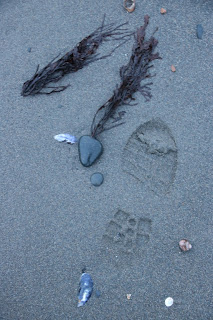Conarium – the Gland That Was The Seat of the Soul
The Seat of the Soul
Icebergs behoove the soul
(both being self-made from elements least visible)
to see them so: fleshed, fair, erected indivisible.
Elizabeth Bishop
The Imaginary Iceberg
Maybe here's where Descartes should come in,
feel himself thin and weary
feel himself thin and weary
create his Cogito and stop, if really
that’s the place to stop because is it? if
it’s been thought it’s caught in a trundle
of ‘it is’? Ok, right, I know he suffers
us (men really, not women, not dogs,
because they don’t
have souls, either of them, and I’d wager
my own against the feather of Ma'at
and say neither
and say neither
did he, nailing his Helena’s poodle to
the wall to draw back its skin, to see,
he said, if it had a soul
within, as if the soul were some
he said, if it had a soul
within, as if the soul were some
homunculus, little men (dogs?). And what, pray,
stopped him from making his own
wife play a Saint Bartholomew? Was it
true his misogyny accosted his compassion?
I’m naïve I know, but not to the brink
of studied enough reason
to know even great masses
true his misogyny accosted his compassion?
I’m naïve I know, but not to the brink
of studied enough reason
to know even great masses
of ice succumb, they labor and birth above
us and all in the weight of water falling
and rising. And great pieces of them,
all the caught breath
us and all in the weight of water falling
and rising. And great pieces of them,
all the caught breath
when they did only to freeze and be
snowed in and blink, imagine, if it had
eyes, and lick its lips if it had a tongue—all this
eyes, and lick its lips if it had a tongue—all this
mingled breath from the world’s entire
bestiary: but then too,
bestiary: but then too,
invisible…and so if you can
imagine it, and it’s just like
imagine it, and it’s just like
the philosopher said!: it’s done and here. Cogito!!
And what if the title of Discourse
on Method it claims it’s all a fake— (he does
take it back
under his wing with the threat
of a heretic's hook and Galileo's house
arrest)
it will give us enough breath to pause,
won't it? Still, isn’t that the purpose of names
and lables— to lead us
on Method it claims it’s all a fake— (he does
take it back
under his wing with the threat
of a heretic's hook and Galileo's house
arrest)
it will give us enough breath to pause,
won't it? Still, isn’t that the purpose of names
and lables— to lead us
a bit, astray maybe, or into cliché
temptation—I mean—
temptation—I mean—
what if it wasn’t called what it was? or
what if it was called what it was the way
Bishop’s “Imaginary Iceberg” is and it's just
as real as if it were right out my starboard
side window just as my ship’s turning,
because it’s true
as real as if it were right out my starboard
side window just as my ship’s turning,
because it’s true
when she says we’d rather have the iceberg
than the ship—it’s not all that complicated. Does that
mean we'd rather have the soul
than the body? The way we're tugged
and ruffed, pulled down from neck
to feet, stuffed and ultimately undone?
At the end of it all?
What do you see when you look out
the window in the rain? Will you say
it depends on the time of day, and if it's dark
and I if I see myself looking back at me (unless
I'm so close to the glass, unless I've
cupped my eyes with my two hands
to shut out all the light I can) I will come
to know me the way Descarte knew himself
and too without having
to prove ... (because we all know the soul
is almost
weightless, no matter how much
we scrub and scrub at the hour
of our death)
mean we'd rather have the soul
than the body? The way we're tugged
and ruffed, pulled down from neck
to feet, stuffed and ultimately undone?
At the end of it all?
What do you see when you look out
the window in the rain? Will you say
it depends on the time of day, and if it's dark
and I if I see myself looking back at me (unless
I'm so close to the glass, unless I've
cupped my eyes with my two hands
to shut out all the light I can) I will come
to know me the way Descarte knew himself
and too without having
to prove ... (because we all know the soul
is almost
weightless, no matter how much
we scrub and scrub at the hour
of our death)
And it's here that I have to ask you, even if
this isn’t the time to, isn’t it a kind
of blasphemy
of blasphemy
to want to wash the windows in the rain? I don’t know
why I want to know this right now, or maybe just ask
because there’s no real know, and it is
raining, and
raining, and
it’s only the breath of a question—I mean,
the rain is real and the desire for clean
glass is real
glass is real
but it is raining and what is it I need
to see anyway? And shit, it's still
dark. It’s the last few days of a June early
morning. I think I like knowing
somewhere it’s starting
dark. It’s the last few days of a June early
morning. I think I like knowing
somewhere it’s starting
to snow, and that that snow is floating on
the ocean and making do with its brief
life, a flake made from nothing but a drop
of water and the faithful attendance
of the world's breath. When we
of the world's breath. When we
come undone, when our skin’s pulled back,
when our spine’s against all that ice of a crowd's
infatuations and it’s nothing but thought, (here's
where you can inhale at last)
I want our substance to rise up
infatuations and it’s nothing but thought, (here's
where you can inhale at last)
I want our substance to rise up
uncaught, but noticed: thought beautiful,
thought worth measuring, but not
with tools that will make or undo or ruin—not with tools
at all but the Naked kind or grace Descartes
wouldn’t deign to know but Bishop,
always looking into her own self, she who is
the ship and she who is all that's frozen only
always looking into her own self, she who is
the ship and she who is all that's frozen only
to come up rising and come up high, high
up out of the water iceberg,
she her own self uncharted, going on, uncaptured,
uncaptained . . .
up out of the water iceberg,
she her own self uncharted, going on, uncaptured,
uncaptained . . .







Comments
Post a Comment